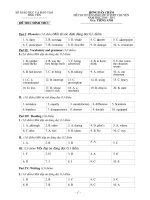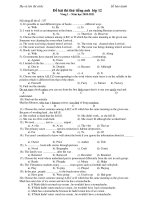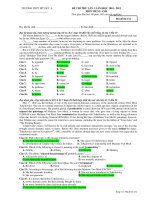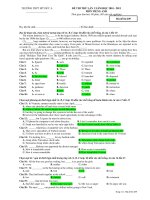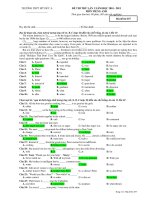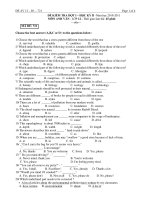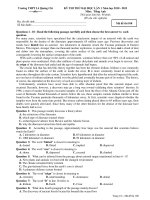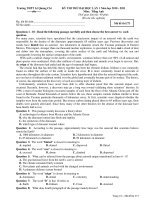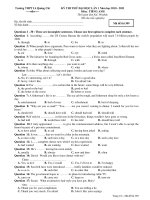- Trang chủ >>
- Văn Mẫu >>
- Văn Biểu Cảm
De thi CD Tieng Anh 12 lan 1 nam hoc 2010 2011
Bạn đang xem bản rút gọn của tài liệu. Xem và tải ngay bản đầy đủ của tài liệu tại đây (207.99 KB, 5 trang )
<span class='text_page_counter'>(1)</span><div class='page_container' data-page=1>
<b> Sở GD-ðT Tỉnh Vĩnh Phúc KỲ THI CHUYÊN ðỀ LẦN I NĂM HỌC 2010-2011 </b>
<b> Trường THPT Trần Phú Môn: Tiếng Anh - Khối: 12 </b>
Thờ<sub>i gian: 90 phút </sub>
<b>Mã ñề<sub>: 155 </sub></b>
<i><b>Mark the letter A, B, C or D on your answer sheet to indicate the correct answer to each of the following </b></i>
<i><b>questions. </b></i>
<b> Câu 1. I was just ______ to go out when you telephoned </b>
<b>A. thinking </b> <b>B. planned </b> <b>C. about </b> <b>D. around </b>
<b> Câu 2. You will spend at least one year working abroad ______ you can find out how things operate overseas </b>
<b>A. as long as </b> <b>B. because </b> <b>C. so that </b> <b>D. so as to </b>
<b> Câu 3. I accidentally ______ John when I was crossing a street downtown yesterday. </b>
<b>A. caught sight of </b> <b>B. lost touch with </b> <b>C. paid attention to </b> <b>D. kept an eye on </b>
<b> Câu 4. Peter's score on the test is the highest in the class. He ______. </b>
<b>A. should have studied all the time </b> <b>B. should study very hard </b>
<b>C. must have to study well </b> <b>D. must have studied very hard </b>
<b> Câu 5. Staying in a hotel costs ______ renting a room in a dormitory for a week </b>
<b>A. as much as twice </b> <b>B. as much twice as </b> <b>C. twice more than </b> <b>D. twice as much as </b>
<b> Câu 6. Don't worry about trying to catch the last train home, as we can easily ______ you up for the night. </b>
<b>A. take </b> <b>B. put </b> <b>C. set </b> <b>D. keep </b>
<b> Câu 7. Mr. Black: "I'd like to try on these shoes, please." Salesgirl: "______" </b>
<b>A. I'd love to. </b> <b>B. Why not? </b> <b>C. By all means, sir. </b> <b>D. That's right, sir. </b>
<b> Câu 8. It's important ______ </b>
<b>A. for her submit her assignment on time. </b> <b>B. for her that to submit her assignment on time. </b>
<b>C. that she submits her assignment on time. </b> <b>D. that she submit her assignment on time. </b>
<b> Câu 9. Jimmy: "Do you feel like going out for a change?" - Laura: "______." </b>
<b>A. That would be great. </b> <b>B. You're welcome. </b>
<b>C. I don't agree, I'm afraid. </b> <b>D. I feel very bored. </b>
<b> Câu 10. She applied for training as a pilot, but they turned her ______ because of her poor eyesight. </b>
<b>A. down </b> <b>B. up </b> <b>C. back </b> <b>D. over </b>
<b> Câu 11. Can you keep quiet for a while? You ______ noise in class! </b>
<b>A. are always making </b> <b>B. are always made </b> <b>C. have always made </b> <b>D. always make </b>
<b> Câu 12. I would really ______ your help with the housework. </b>
<b>A. appreciate </b> <b>B. take </b> <b>C. thank </b> <b>D. respect </b>
<b> Câu 13. She asked me how far ______ from my house to school. </b>
<b>A. it is </b> <b>B. is it </b> <b>C. it was </b> <b>D. was it </b>
<b> Câu 14. The window was so high up that ______ I could see was the sky. </b>
<b>A. thus </b> <b>B. only </b> <b>C. just </b> <b>D. all </b>
<b> Câu 15. There was a big hole in the road which ______ the traffic </b>
<b>A. kept down </b> <b>B. stood back </b> <b>C. held up </b> <b>D. sent back </b>
<b> Câu 16. John: "Do you think that we should do something to protect our environment?" Laura: "______" </b>
<b>A. There's no doubt about it. </b> <b>B. Well, that's very surprising. </b>
<b>C. Yes, it's an absurd idea. </b> <b>D. Of course not. You bet! </b>
<b> Câu 17. Bill: "Can I get you another drink?" Jerry: "______." </b>
<b>A. Forget it. </b> <b>B. No, it isn't. </b> <b>C. Not just now. </b> <b>D. No, I'll think it over. </b>
<b> Câu 18. The other driver failed to signal his ______ to turn right so I had to brake suddenly </b>
<b>A. intention </b> <b>B. design </b> <b>C. idea </b> <b>D. purpose </b>
<b> Câu 19. Having ______ the table, Mrs. Roberts called the family for supper </b>
<b>A. spread </b> <b>B. ordered </b> <b>C. laid </b> <b>D. completed </b>
<b> Câu 20. That hotel is so expensive. They ______ you sixty pounds for bed and breakfast. </b>
<b>A. fine </b> <b>B. charge </b> <b>C. cost </b> <b>D. take </b>
<b> Câu 21. He was in ______ of a large number of men </b>
<b>A. leadership </b> <b>B. direction </b> <b>C. charge </b> <b>D. management </b>
<b> Câu 22. Increasing ______ of fruit in the diet may help to reduce the risk of heart disease. </b>
</div>
<span class='text_page_counter'>(2)</span><div class='page_container' data-page=2>
<b> Câu 23. Buy the new ______ of soap now on sale; it is softer than all others! </b>
<b>A. mark </b> <b>B. manufacture </b> <b>C. brand </b> <b>D. model </b>
<b> Câu 24. Mrs. Robinson ______ great pride in her cooking </b>
<b>A. gets </b> <b>B. has </b> <b>C. finds </b> <b>D. takes </b>
<b> Câu 25. It was not until she had arrived home ______ remembered her appointment with the teacher. </b>
<b>A. and she </b> <b>B. when she had </b> <b>C. she </b> <b>D. that she </b>
<b> Câu 26. The dentist told him to open his mouth ______ </b>
<b>A. broad </b> <b>B. much </b> <b>C. wide </b> <b>D. greatly </b>
<b> Câu 27. The price of fruit has increased recently, ______ the price of vegetables has gone down. </b>
<b>A. when </b> <b>B. otherwise </b> <b>C. whether </b> <b>D. whereas </b>
<b> Câu 28. He looks skinny, but ______ he is very healthy. </b>
<b>A. actually </b> <b>B. also </b> <b>C. practically </b> <b>D. consequently </b>
<b> Câu 29. ______ had the curtain been raised than the light went out. </b>
<b>A. Scarcely </b> <b>B. Only when </b> <b>C. Hardly </b> <b>D. No sooner </b>
<b> Câu 30. ______ goes the bus; now we will have to walk! </b>
<b>A. There </b> <b>B. Early </b> <b>C. At once </b> <b>D. On time </b>
<i><b> Mark the letter A, B, C or D on your answer sheet to show the underlined part that needs correction. </b></i>
<b> Câu 31. No mater how old is she, I will marry her </b>
<b>A. is she </b> <b>B. marry her </b> <b>C. No mater </b> <b>D. how old </b>
<b> Câu 32. Unlike many writings of her time, she was not preoccupied with morality. </b>
<b>A. with morality </b> <b>B. was not preoccupied C. many writings </b> <b>D. of her time </b>
<b> Câu 33. The porter told us the train would leave five minutes early </b>
<b>A. would leave </b> <b>B. told us </b> <b>C. early </b> <b>D. five minutes </b>
<b> Câu 34. He said that the inflation rate in Greece was as high as in his country </b>
<b>A. as high as </b> <b>B. inflation rate </b> <b>C. his country </b> <b>D. said that </b>
<b> Câu 35. It was a six-hours journey; we were completely exhausted when we arrived. </b>
<b>A. we arrived </b> <b>B. completely </b> <b>C. exhausted </b> <b>D. a six-hours </b>
<i><b> Read the following passage and mark the letter A, B, C or D on your answer sheet to indicate the correct </b></i>
<i><b>words for each of the blanks. </b></i>
The combination of music and study has long been a source of disagreement between adults and children.
Parents and teachers alike maintain that silence is important when learning, whereas youngsters (36)_______
that their favourite sounds help them concentrate.
Now a study shows that the grown-ups have been (37)_______ all along. Psychologists in Florida tested
how fast students wrote essays with and without music in the (38)_______ . They found that the sounds
(39)_______ progress down by about sixty words per hour. "This demonstrates clearly that it is difficult to
(40)_______ with listening and writing at the same time," said Dr Sarah Randall. She also (41)_______ to the
conclusion that it is a myth that instrumental music is less distraction than vocals. "All types of music
(42)_______ the same effect," she said in her report. "One's ability to pay attention and write fluently is likely to
be (43)_______ by both vocal and instrumental music," she added.
The research also (44)_______ that the idea that music could improve performance was wrong. "Writing an
essay is a complex (45)_______ . You are recalling information and putting it in order. An additional stimulus in
the form of music is bound to distract."
<b> Câu 36. A. insist </b> <b>B. think </b> <b>C. hope </b> <b>D. believe </b>
<b> Câu 37. A. precise </b> <b>B. true </b> <b>C. valid </b> <b>D. right </b>
<b> Câu 38. A. background </b> <b>B. surrounding </b> <b>C. circumstances </b> <b>D. setting </b>
<b> Câu 39. A. lowered </b> <b>B. decreased </b> <b>C. reduced </b> <b>D. slowed </b>
<b> Câu 40. A. manage </b> <b>B. stand </b> <b>C. support </b> <b>D. cope </b>
<b> Câu 41. A. arrived </b> <b>B. drew </b> <b>C. came </b> <b>D. reached </b>
<b> Câu 42. A. had </b> <b>B. brought </b> <b>C. kept </b> <b>D. made </b>
<b> Câu 43. A. interfered </b> <b>B. bothered </b> <b>C. shocked </b> <b>D. disturbed </b>
<b> Câu 44. A. demonstrated </b> <b>B. displayed </b> <b>C. pointed </b> <b>D. presented </b>
</div>
<span class='text_page_counter'>(3)</span><div class='page_container' data-page=3>
<i><b> Mark the letter A, B, C or D on your answer sheet to indicate the sentence that is closet in meaning to the </b></i>
<i><b>original sentence in each of the following questions. </b></i>
<b> Câu 46. It's thought that the accident was caused by human error. </b>
<b>A. People think the accident to have been caused by human error. </b>
<b>B. The accident is thought to be caused by human error. </b>
<b>C. People think the accident to be caused by human error. </b>
<b>D. The accident is thought to have been caused by human error. </b>
<b> Câu 47. He asked me how I earned my living. </b>
<b>A. He wanted to know how I enjoyed my life </b> <b>B. He wanted to know what my job was </b>
<b>C. He wanted to know how I lived </b> <b>D. He wanted to know how much I got for a salary </b>
<b> Câu 48. Everyone can take a seat at that table </b>
<b>A. Everyone can carry a chair to that table </b> <b>B. Everyone can take a chair away from that table </b>
<b>C. Everyone can remain seated at that table </b> <b>D. Everyone can sit down at that table </b>
<b> Câu 49. We lost the game because I made mistakes </b>
<b>A. It was not my fault that we lost the game </b> <b>B. We didn't win the game because my mistakes </b>
<b>C. We lost the game because my mistake. </b> <b>D. It was my fault that we didn't win the game </b>
<b> Câu 50. He last had his eyes tested ten months ago. </b>
<b>A. He hasn't had his eyes tested for ten months. </b>
<b>B. He didn't have any test on his eyes in ten months. </b>
<b>C. He had tested his eyes ten months ago. </b>
<b>D. He had not tested his eyes for ten months then. </b>
<b> Câu 51. She knows a lot more about it than I do </b>
<b>A. I do not know as much about it as she does </b> <b>B. I know as much about it as she does. </b>
<b>C. I know much more about it than she does </b> <b>D. I don't know more about it than she does </b>
<b> Câu 52. "Cigarette?" he asked. "No, thanks" I said. </b>
<b>A. He asked for a cigarette, and I immediately refused. </b>
<b>B. He mentioned a cigarette, so I thanked him. </b>
<b>C. He asked if I was smoking, and I denied at once. </b>
<b>D. He offered me a cigarette, but I promptly declined. </b>
<b> Câu 53. We've run out of tea. </b>
<b>A. There's not much more tea left </b> <b>B. We have to run out to buy some tea </b>
<b>C. we didn't have any tea </b> <b>D. There's no tea left </b>
<b> Câu 54. They regret ever doing business with him. </b>
<b>A. They wish they wouldn't do business with him </b> <b>B. The wish they had never done business with him </b>
<b>C. They wish they didn't do business with him </b> <b>D. They did business with him but failed </b>
<b> Câu 55. "Why don't we go out for dinner?" said Mary. </b>
<b>A. Mary demanded a dinner out </b> <b>B. Mary ordered a dinner out </b>
<b>C. Mary requested a dinner out </b> <b>D. Mary suggested a dinner out </b>
<i><b> Read the following passage and mark the letter A, B, C or D on your answer sheet to indicate the correct </b></i>
<i><b>answer to each of the questions. </b></i>
</div>
<span class='text_page_counter'>(4)</span><div class='page_container' data-page=4>
"Keep two or three fierce dogs", which reminded me of a case I read about where the burglars' loot included the
family's pet poodle.
<b> Câu 56. The police are said ______. </b>
<b>A. to be able to do something if there is any definite evidence </b>
<b>B. to have recovered most of the stolen goods </b>
<b>C. to be unable to do anything even if there is any definite evidence </b>
<b>D. to have helped much in most cases </b>
<b> Câu 57. The word "revealed" in the passage mostly means ______. </b>
<b>A. looked </b> <b>B. disclosed </b> <b>C. concealed </b> <b>D. purchased </b>
<b> Câu 58. According the passage the burgled items may include all the following EXCEPT </b>
<b>A. vacuum cleaner </b> <b>B. dog </b> <b>C. food </b> <b>D. alarm </b>
<b> Câu 59. According to the passage, who may appear to be the typical burglars? </b>
<b>A. young people </b> <b>B. early teenagers </b> <b>C. professional criminals </b> <b>D. old people </b>
<b> Câu 60. According to the writer, "keeping two or three fierce dogs" is not a really good advice to solve the </b>
problem because ______.
<b>A. The police can't do anything with the dogs at all </b>
<b>B. There was a case in which the burglars stole the family's dog. </b>
<b>C. The dogs are unable to fight against the burglars </b>
<b>D. The dogs sleep on the ground floor </b>
<b> Câu 61. The thing most people involved in the survey have in common is that ______ </b>
<b>A. They all live on the ground floor </b> <b>B. They are all rich </b>
<b>C. They all had burglars break into their houses </b> <b>D. They all keep fierce dogs </b>
<b> Câu 62. Which of the following is NOT TRUE according to the passage? </b>
<b>A. People involved in the survey don't have valuable paintings or a sideboard full of family silverware at </b>
their homes
<b>B. People who live on the ground floor have more risk being burgled than others </b>
<b>C. People can rely on special locks to solve the problem </b>
<b>D. Most people feel angry and confused when they have their house turned upside down and their favourite </b>
things stolen
<b> Câu 63. The phrase "a Picasso" in the passage mostly means ______. </b>
<b>A. a painting of Picasso </b> <b>B. a painting by Picasso C. Picasso's property </b> <b>D. Picasso's house </b>
<b> Câu 64. Which of the following is TRUE according to the passage? </b>
<b>A. People can more easily accept the fact that they were burgled by amateur criminals than by professional </b>
ones
<b>B. Being burgled is in the bottom of the list of Top Ten fears. </b>
<b>C. Ten people were involved in the survey </b>
<b>D. Typically, the burglars stole easily transportable items </b>
<b> Câu 65. The phrase "come up with" in the passage mostly means ______. </b>
<b>A. look up </b> <b>B. go to </b> <b>C. find out </b> <b>D. get on </b>
<i><b>Read the following passage and mark the letter A, B, C or D on your answer sheet to indicate the correct </b></i>
<i><b>answer to each of the questions. </b></i>
In many cultures of the world, the transition from adulthood to old age is not seen, as it is in ours, as a
lessening of activity, a retreat from social usefulness. For the old there is still 'much to be done', much that needs
doing and much that they can do better than any others. Such societies do not see old age as an end to life, but as
a source of continuity, linking the future with the past, death with life. This more positive attitude to the aged
does not necessarily demand a belief in after-life, or in God; it depends simply upon the recognition of the vital
role that old people have to play in the ongoing life of their society.
In the Western world things are different. For all to many old people here, the persistent reference to the
'golden years' of old age has become a cruel hoax, a lie, a promise that can never be fulfilled. The
should-have-been-golden years are discovered instead to be a frightening ante-room to extinction, a time of loneliness and
suffering, to be postponed as long as possible. Compulsory retirement for many means little more than
</div>
<span class='text_page_counter'>(5)</span><div class='page_container' data-page=5>
compelled, unwanted and totally unnecessary. Even when old age is accompanied by infirmity or incapacity, the
old have a wealth to give, and could contribute until the very day of their death, as they do in other societies.
<b> Câu 66. Which of the following clearly describes the old people outside the Western world? </b>
<b>A. Useful, dependent, and important </b> <b>B. Independent, useful and incompetent </b>
<b>C. Incompetent, useful and dependent </b> <b>D. Independent, useful and important </b>
<b> Câu 67. Which of the following is TRUE according to the passage? </b>
<b>A. Considering the old age as sources of continuity is a negative attitude to the aged. </b>
<b>B. In all cultures of the world, there is still much for the old to do. </b>
<b>C. The writer lives in a Western country. </b>
<b>D. Many old people in the Western world are obliged to retire although they don't really want. </b>
<b> Câu 68. Why is the old age not the golden years for Western people? Because ______. </b>
<b>A. for them there is much to be done </b>
<b>B. they can never fulfill anything. </b>
<b>C. they can contribute until the very day of their death. </b>
<b>D. it's the time that they feel lonely and have to suffer a lot </b>
<b> Câu 69. In many cultures, people have more positive attitudes to the aged because ______. </b>
<b>A. they see old age as an end to life </b>
<b>B. they recognize the vital role of the old people in their society. </b>
<b>C. they hold a belief in after-life or in God </b>
<b>D. the old people are incompetent and dependent </b>
<b> Câu 70. The author of the passage puts the word "golden years" in quotation marks because ______. </b>
<b>A. People in Western countries are happy with their golden old -aged years. </b>
<b>B. He envies with the golden old-aged years of Western people. </b>
<b>C. For old people in Western countries, the golden years of old age is only a dream that never comes true. </b>
<b>D. Old people in the Western world really enjoy their golden years of old age. </b>
<i><b> Choose from option A, B, C or D that best suits the meanings of the underlined word(s). </b></i>
<b> Câu 71. Earnest Hemmingway worked as a war correspondent during the Second World War. </b>
<b>A. protester </b> <b>B. mail deliverer </b> <b>C. journalist </b> <b>D. writer </b>
<b> Câu 72. Japan ranks among the world's leading industrialized countries. </b>
<b>A. concerning lead </b> <b>B. in first position </b> <b>C. poor </b> <b>D. rich </b>
<b> Câu 73. The north rim of the canyon has an average annual rainfall of about 660 millimeters. </b>
<b>A. total amount </b> <b>B. recent </b> <b>C. average </b> <b>D. yearly </b>
<b> Câu 74. There was a school of whales moving towards the ship. </b>
<b>A. a building </b> <b>B. a large number </b> <b>C. many classes </b> <b>D. a tail </b>
<b> Câu 75. Over two-thirds of Canada's imports are from this neighbouring country </b>
<b>A. friendly </b> <b>B. powerful </b> <b>C. nearby </b> <b>D. relative </b>
<i><b> Mark the letter A, B, C, or D on your answer sheet to indicate the word that differs from the rest in the </b></i>
<i><b>position of the main stress in each of the following questions. </b></i>
<b> Câu 76. A. particular </b> <b>B. bacteria </b> <b>C. interview </b> <b>D. idea </b>
<b> Câu 77. A. interesting </b> <b>B. depression </b> <b>C. important </b> <b>D. development </b>
<b> Câu 78. A. champagne </b> <b>B. political </b> <b>C. deliver </b> <b>D. necessary </b>
<b> Câu 79. A. recognize </b> <b>B. career </b> <b>C. purpose </b> <b>D. farewell </b>
</div>
<!--links-->
